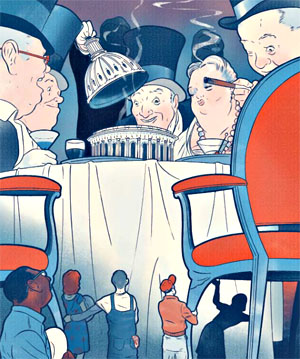Speaking of my upcoming piece for the magazine, one of its major themes is the postwar decline of private-sector unions in America, culminating in the annus horribilis of 1978, which one business historian called “Waterloo” for organized labor.  (Why? You’ll have to read the story to learn more! It’ll be online Tuesday and it comes with lots of nifty charts and illustrations, like the one on the right.) Today, Greg Sargent says 2011 could be much the same for public sector unions:
(Why? You’ll have to read the story to learn more! It’ll be online Tuesday and it comes with lots of nifty charts and illustrations, like the one on the right.) Today, Greg Sargent says 2011 could be much the same for public sector unions:
As I laid out here yesterday, this is only one of many national proposals being pushed by state governments across the country designed to achieve similarly transformative changes in that relationship between public workers and government.
Pro-labor and anti-labor people I’ve spoken with in recent days both agree that a defeat in Wisconsin could make it easier for other similar initiatives to advance. One anti-union activist I spoke to yesterday made it clear that if labor loses here, anti-union forces will point to the defeat to stiffen the spines of other GOP-controlled governments who are eyeing similarly transformative efforts but might be wary of a battle on the scale of the one unfolding in Wisconsin. This is just the beginning.
I won’t pretend to be the world’s most full-throated defender of public sector unions. If I could trade ten points of union density in the private sector for ten points in the public sector, I’d take the trade in a heartbeat. But that is, obviously, not the trade on offer. Nor is what’s happening in Wisconsin merely hard bargaining during tough economic times. That would be understandable. Rather, it’s an effort to destroy one of the few institutions left that fights relentlessly for the economic interests of the middle class. That’s why conservatives oppose unions of all kinds, both public and private, and regardless of their faults, that’s why they deserve our support.


















